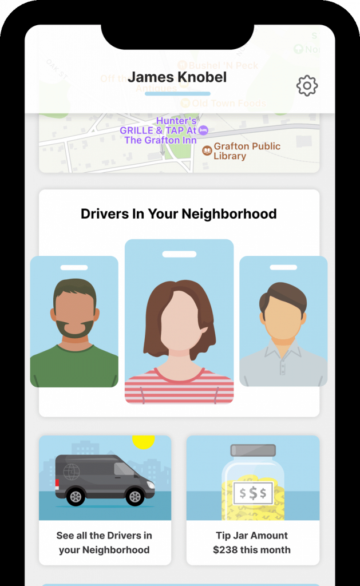
Our weekly round-up of interesting news and background stories on start-ups and innovations in supply chain and logistics. Follow @LogisticsMatter on Twitter to stay up to date on what happens in the industry.
Transportation: Self-Driving Vehicles
The hard part is autonomous systems have to be inherently perfect. When you have a human driving you only need to have the system take over when the human makes a mistake, but it’s not that frequent. Autonomous systems make silly mistakes all the time. Our LiDAR makes it a hundred to a thousand times easier, and it’s still hard, even with that. That’s why trying to do it without it is a joke.
Robotaxis Are More Than a Decade Away, Says Luminar’s CEO Austin Russell
According to Wayda, the change in approach can be measured by the yardstick of the six levels of autonomous driving defined by the Pennsylvania-based engineering standards group SAE International. Those ranks span from Level 0 (No Driving Automation) through Level 1 (Driver Assistance), Level 2 (Partial Driving Automation), Level 3 (Conditional Driving Automation), Level 4 (High Driving Automation), and Level 5 (Full Driving Automation).
“Given the current economic downturn, recession fears and tightening of [private equity] and [venture capital] dollars, companies are reevaluating their position on Level 4 and Level 5. While we believe Level 4 is attainable it is still several years away from becoming mainstream,”
Stumbles by autonomous car startups could slow rollout of self-driving trucks
What is changing is the hype. The big bets aren’t paying off. Automakers and big venture capital firms that were bullish about the prospect of millions of robot cars roaming the streets in the near future are losing money. Like lots of money. SoftBank, which poured billions of dollars into AV projects like Cruise, Nuro, and Uber, recently reported losing $23 billion from its Vision Fund investments.
I think Ed Niedermeyer, co-host of the podcast Autonocast, got it right when he tweeted, “We make everything all about technology these days, the good and the bad alike, but the ‘self-driving car bubble’ was a manifestly human failure. Hubris, greed, manipulation and self-deception are what failed in the AV sector… not technology.”
Driverless cars aren’t going away, but we need to lower our expectations about them
“It starts with taking on the challenge holistically, rather than with incremental updates and adjustments, and values safety above all else. Waabi’s unique AI-first approach accomplishes both. It has the potential to finally realize the world-changing impact of self-driving technology, and it’s all backed by a phenomenal team. I’m very excited to join the team and apply my decades of experience to this mission.”
Self-Driving Veteran Jur van den Berg Joins Waabi
Einride also unveiled its next-generation remote truck, the Gen 2 Rigid Large. The straight truck has a larger cargo hold, updated optics form sensors and updated maximum speed with night vision capabilities. The first Gen 2 trucks will hit roadways in 2023.
Along with the new truck are updates to Einride’s Remote Interface, which helps control the vehicles. The new interface features more adjustable settings and monitor setup that ensures optimal remote operator comfort, as well as a new flat pack construction allowing for easier manufacturing, scalability and setup on site.
Einride EV truck network to launch near Port of LA
Supply Chain and Logistics Start-Ups: Profits, Loss, Growth and Funding
As was the case in the first two quarters of 2022, Uber’s delivery segment again lagged behind mobility in Q3.
It recorded lower revenue growth — and less revenue outright — than the firm’s mobility business. Delivery also had an adjusted EBITDA of about $181 million compared to nearly $900 million for mobility. The two segments posted identical gross bookings figures, but mobility saw significantly higher growth in trips.
Uber posts record $512M EBITDA but $1.2B net loss
The merger between Uber Freight and Transplace was made final months ago. The more practical amalgamation of the companies — combining their offerings on one platform — now has been completed as well.
The Transplace name will be less prominent as a result. As Frank McGuigan, the president and COO of Uber Freight (NYSE: UBER) and formerly with Transplace, said in an interview with FreightWaves, when sales personnel now reach out to customers, existing or potential, they introduce themselves as being from Uber Freight.
Lior Ron, CEO of Uber Freight, said in the same interview, “We have one product team, one engineering team, one technical team and one operations team to bring the platform together.”
Uber Freight, Transplace now 1 operation with a wall on proprietary data
Flexport, one of the most valuable logistics startups, is looking to add about 400 engineers to double its technical team by next year, a top company executive told Reuters.
The hiring spree, spearheaded by Dave Clark who joined Flexport in September after two decades at Amazon.com (NASDAQ:AMZN), comes at a time when many big tech companies and venture capital-backed startups are either freezing hiring or laying off employees amid economic uncertainty.
Logistics startup Flexport plans hiring spree, to double engineers in 2023
Supply chain visibility provider project44 announced Thursday it has secured $80 million in a funding round led by Generation Investment Management and A.P. Moller Holding.
The latest round increases project44’s valuation to $2.7 billion, up 12% from its last funding round in January. The company said the additional funding will drive several key initiatives, including upgrading a system to measure supply chain emissions globally across all modes of transportation.
Project44 reaches $2.7B valuation with new funding
“We are going to be investing heavily in the software that carrier reps and truckers used to find each other and that will be ancillary to our marketplace,” Newtrul CEO and co-founder Ed Stockman told FreightWaves. “The marketplace is where the transactions happen — there’s a lot of free software that we can provide to both sides to make their lives easier, make communications easier, and those are the tools that we’re going to double down on.”
Founded in 2018, Newtrul is a digital freight matching platform that integrates with freight brokers to share available loads with carriers digitally in real time. Newtrul aims to reduce the amount of time and resources needed for two parties to complete a transaction.
Logistics startup Newtrul raises $5M to be ‘Expedia’ of freight booking
Lyft said Thursday it is laying off 13% of its workforce as it tries to reduce operating expenses, according to a securities filing.
The ride-hailing company described the cuts as proactive step to ensure it “is set up to accelerate execution and deliver strong business results in Q4 of 2022 and in 2023.”
Lyft also reiterated Thursday it is sticking with its previously stated guidance on third quarter 2022 revenues, contribution margin and adjusted EBITDA. It has targeted $1 billion in adjusted EBITDA with more than $700 million in free cash flow for 2024.
Lyft lays off 13% of workforce as it tries to slash operating expenses
Volocopter, a German startup building electric vertical takeoff and landing (eVTOL) vehicles, has secured $182 million for the second signing of its Series E round. That’s on top of the $170 million Volocopter raised for the same round in March at a $1.87 billion post-money valuation.
Volocopter is currently in full swing testing its two-seater VoloCity air taxi based on the requirements set by the European Union Aviation Safety Agency (EASA). The fresh funds will flow into the company’s testing regime to help bring it closer to Special Condition for small category VTOL aircraft certification and, by extension, commercialization. Volocopter hopes to certify its aircraft by the second half of 2023 and launch initial revenue-generating rides by 2024, the company said.
Volocopter raises $182M to bring air taxi closer to certification
Cyber Security
The Does LogisticsMatter? The podcast is all about trends and innovations in supply chain and logistics. This episode features Frank Breedijk, Chief Information Security Officer at Schuberg Philis…
In this episode, Frank talks about how hackers hack into corporate systems and installations, and we discuss several examples of actual cybersecurity attacks in the supply chain and logistics industry. We discuss the dangers, what companies can do to prevent being hacked, and what you need to do when you get hacked.
Cyber Threats in Supply Chain and Logistics
The authors of The Great Disconnect said, “Whether through spoofing GPS, or hijacking a ship’s control system, the ability of a nation state to manipulate the movement of maritime vessels can cause billions of dollars of disruption, shock the global supply chain, increase the cost of goods, and even instigate international conflict. Fortunately, direct attacks by nation-states are rare; the industry is far more likely to suffer an attack from an unintentional insider.”
Hackers could re-create Ever Given grounding in Suez Canal
Other News: Space Freight, Hyperloop, Supply Chain Innovation & Driver-Facing Camera’s
- SEO Powered Content & PR Distribution. Get Amplified Today.
- Platoblockchain. Web3 Metaverse Intelligence. Knowledge Amplified. Access Here.
- Source: https://logisticsmatter.com/start-ups-and-innovations-in-supply-chain-and-logistics-oct-29-nov-4-2022/
- $1 billion
- 1
- 10
- 11
- 2018
- 2022
- 2024
- 7
- 9
- a
- ability
- About
- above
- accelerate
- According
- across
- Additional
- adjustable
- Adjusted
- After
- agency
- aims
- AIR
- aircraft
- All
- Allowing
- Amazon
- Amazon.com
- Amid
- amount
- and
- announced
- Apply
- approach
- Assistance
- attack
- Attacks
- Attainable
- austin
- authors
- automakers
- Automation
- autonomous
- autonomous car
- autonomous systems
- AV
- available
- aviation
- backed
- background
- Bad
- based
- becoming
- behind
- being
- believe
- Bets
- between
- Big
- big tech
- Big Tech Companies
- Billion
- billions
- bookings
- Both Sides
- bring
- brokers
- Building
- Bullish
- business
- capabilities
- capital
- car
- Cargo
- carriers
- cars
- case
- Cash
- cash flow
- Category
- Cause
- ceo
- Certification
- chain
- challenge
- change
- changing
- chief
- chief information security officer
- closer
- Co-founder
- COM
- combining
- comfort
- commercialization
- Communications
- Companies
- company
- Company’s
- compared
- complete
- Completed
- condition
- conflict
- construction
- contribution
- control
- coo
- Corporate
- Cost
- could
- cruise
- Current
- Currently
- Customers
- cuts
- Cybersecurity
- dangers
- Date
- Dave
- Days
- decade
- decades
- deliver
- delivery
- Den
- described
- digital
- digitally
- direct
- discuss
- Disruption
- dollars
- double
- down
- DOWNTURN
- drive
- driver
- driving
- each
- easier
- EBITDA
- Economic
- economic downturn
- ed
- either
- Electric
- Emissions
- employees
- Engineering
- Engineers
- ensure
- ensures
- equity
- Ether (ETH)
- European
- european union
- EV
- Even
- EVER
- everything
- evtol
- examples
- excited
- execution
- executive
- existing
- expectations
- expenses
- experience
- extension
- Failed
- Failure
- fears
- Features
- Figures
- Filing
- final
- Finally
- Find
- firms
- First
- flat
- flow
- form
- formerly
- Fortunately
- Free
- free software
- Freezing
- freight
- frequent
- fresh
- from
- full
- fund
- funding
- Funding Round
- funds
- future
- Gen
- generation
- German
- get
- given
- Global
- Globally
- going
- good
- goods
- gps
- great
- Greed
- gross
- Group
- Growth
- hack
- hacked
- hackers
- Half
- happen
- happens
- Hard
- heavily
- help
- helps
- High
- higher
- Hiring
- Hit
- hold
- holding
- hopes
- How
- HTTPS
- hubris
- human
- Hype
- Hyperloop
- identical
- Impact
- in
- Including
- Increase
- Increases
- industry
- information
- information security
- initial
- initiatives
- Innovation
- innovations
- Insider
- Integrates
- interesting
- Interface
- International
- Interview
- introduce
- investing
- investment
- Investments
- IT
- January
- join
- joined
- Joins
- Key
- landing
- large
- larger
- Last
- latest
- launch
- LAYS OFF
- Led
- Level
- level 4
- levels
- lidar
- likely
- Lives
- loads
- logistics
- looking
- losing
- loss
- Lot
- made
- Mainstream
- make
- MAKES
- management
- Manipulation
- manufacturing
- many
- March
- Margin
- Maritime
- marketplace
- matching
- maximum
- measure
- Merger
- million
- millions
- Mission
- mistake
- mistakes
- mobility
- money
- Monitor
- months
- more
- most
- movement
- name
- Nasdaq
- nation
- Nation State
- Near
- nearly
- Need
- needed
- net
- network
- New
- news
- next
- next-generation
- night
- Nuro
- NYSE
- Oct
- Offerings
- Officer
- ONE
- operating
- operation
- Operations
- operator
- optics
- optimal
- Other
- Pack
- part
- parties
- paying
- perfect
- Personnel
- phenomenal
- plans
- platform
- plato
- Plato Data Intelligence
- PlatoData
- podcast
- position
- posted
- Posts
- potential
- Practical
- president
- prevent
- previously
- private
- Private Equity
- Proactive
- Product
- profits
- projects
- prominent
- proprietary
- prospect
- provide
- provider
- Q3
- Quarter
- raised
- raises
- ranks
- RARE
- reach
- Reaches
- real
- real-time
- realize
- recently
- recession
- record
- recorded
- reduce
- regime
- remote
- Reported
- Requirements
- Resources
- result
- Results
- Reuters
- revenue
- revenue growth
- revenues
- robot
- robot cars
- RON
- round
- Safety
- Said
- sales
- same
- Scalability
- Second
- Secured
- Securities
- security
- segment
- segments
- self-driving
- self-driving technology
- sensors
- September
- Series
- set
- settings
- setup
- several
- Share
- Sides
- significantly
- signing
- site
- SIX
- slow
- small
- SOFTBANK
- Software
- Space
- special
- speed
- standards
- start-ups
- starts
- startup
- Startups
- State
- stated
- stay
- Step
- sticking
- Still
- Stories
- straight
- strong
- supply
- supply chain
- system
- Systems
- Take
- taking
- Talks
- targeted
- team
- tech
- tech companies
- Technical
- Technology
- Testing
- The
- their
- themselves
- Third
- threats
- Through
- tightening
- time
- times
- to
- together
- tools
- top
- transaction
- Transactions
- transportation
- Trends
- truck
- Trucks
- Uber
- Uncertainty
- union
- unique
- unveiled
- updated
- Updates
- Valuable
- Valuation
- Values
- Vehicles
- venture
- venture capital
- venture capital Firms
- veteran
- visibility
- vision
- VISION FUND
- weekly
- What
- which
- while
- WHO
- will
- without
- Workforce
- world-changing
- year
- years
- zephyrnet












